Lennon to McCartney, 1972: We Hope Someday You’ll Join Us
by Rip Rense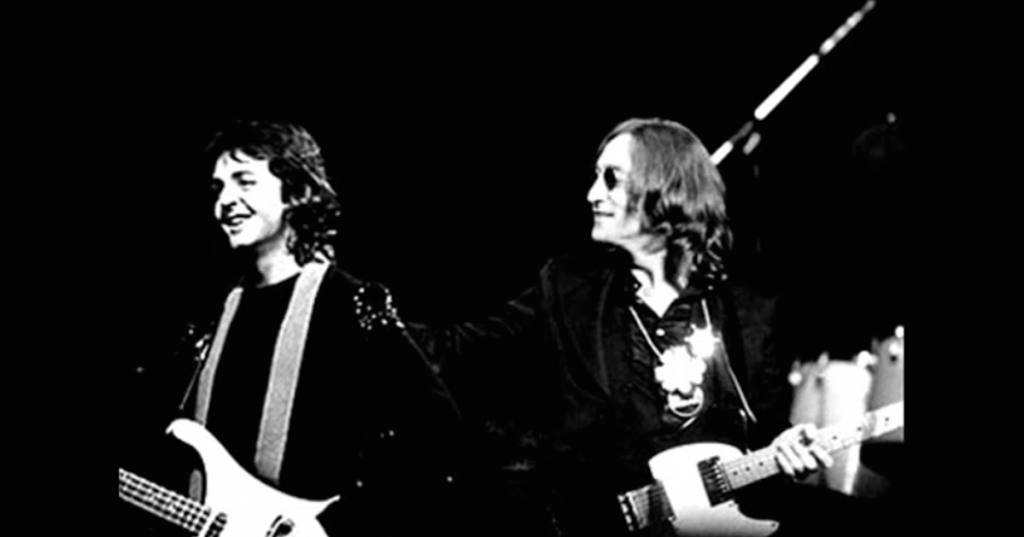
Lennon and McCartney never performed together after the Beatles split, but this is how it might have looked if they had.
John Lennon sent an olive branch to Paul McCartney in a 1972 telegram proposing that they “forget the past” and that McCartney’s new band, Wings, join Lennon’s Plastic Ono Band and the Rolling Stones in a proposed charity concert at Madison Square Garden.
This is the only known instance of Lennon proposing a rapprochement with his former songwriting partner and bandmate. The 2024 discovery rewrites Beatles history; it is a “game-changer,” as one renowned Beatles author/historian told this writer, off the record.
It also shows how, despite their estrangement, the two men continued to compete and influence one another creatively.
The telegram surfaced recently as part of the 2024 John Lennon Mind Games album (1973) boxed set. It is dated February 7, 1972, when the two ex-Beatles were still on strained terms after the break-up of the group in 1970, and their infamous pot shots at one other on the 1971 albums, Lennon’s Imagine and McCartney’s Wild Life and Ram.
The peace overture seems to have been prompted, at least in part, by Lennon’s admiration for McCartney’s new protest song, “Give Ireland Back to the Irish”—the debut single from Wings—inspired by the massacre of 26 unarmed civil rights protestors by British soldiers on Jan. 30, 1972, the so-called “Bloody Sunday” incident. (The single was not released until Feb. 25, but Wings played it on their tour of United Kingdom colleges throughout the month.)
Related: When John met Paul
The issue was important to Lennon, who had already written and publicly performed his yet-unreleased song, “The Luck of the Irish,” which would be included on his June 1972 album, Sometime In New York City (along with his own commentary about the Jan. 30 massacre, “Sunday, Bloody Sunday”). The former Beatle had joined an Aug. 11, 1971, London protest against continued British occupation of Northern Ireland, just before moving to New York. He was at the height of his now well-known activist phase, which would prompt surveillance and harassment by the administration of President Richard Nixon.
The “give peace a chance” invitation to Paul also likely sprang from McCartney’s efforts in late 1971 to re-establish his friendship with Lennon (something that would finally reach fruition in 1974 during Lennon’s “Lost Weekend” in Los Angeles). McCartney is known to have met with his old partner in New York City during January 1972, in an effort to sort out business and personal matters. In a Jan. 29 discussion, the two reportedly agreed to end their public insults. “Give Ireland Back the Irish” was written the next day.
Listen to Wings’ “Give Ireland Back to the Irish”
The telegram is on Apple Memorandum stationery, addressed to “Paul McCartney and Linda” from “J. & Y.” (John and Yoko), and reads as follows:
Right on brother and sister!’ Now what do we do with “The Luck of the Irish” and “Sunday Bloody Sunday””!? Would you do a Madison Square Garden with Wings, Plastic Ono, and Stones?! We’ve already talked to Mick!(blacked out). Also, in three weeks actually go to Ireland (again Possibly Stones!) let’s forget our past and save some people! Good luck anyway, xxxxx we’re proud of you.
Love,
Sonny and Cher O’Lennon
Lennon was apparently implying that he had been planning to release “The Luck of the Irish” and “Sunday Bloody Sunday” as a single, but that McCartney’s song on the subject beat him to the punch. The Madison Square Garden concert’s purpose is undisclosed—aside from “save some people”—but given the context, and Lennon’s daring idea that the concert move to Ireland later, it is safe to assume that it involved outright support for groups opposing British occupation. The most likely candidate would have been Irish Northern Aid (NORAID), founded in 1970, the primary supporters of the Irish Republican movement. Lennon intended that proceeds from “The Luck of the Irish,” written in November 1971 (a filmed performance of which was quickly bootlegged), go to NORAID.
Listen to Lennon’s “The Luck of the Irish”
Then there is this remarkable postscript
P.S. No A.K. at M.S.G. if it’s uncool.
This would almost certainly refer to Allen Klein, the man tabbed by Lennon, George Harrison and Ringo Starr to manage the Beatles in 1969, against McCartney’s wishes, fueling the band’s split. By 1972, Klein’s draconian methods and questionable handling of funds left him out of favor with Lennon, Harrison and Starr, and the matter finally devolved into dueling lawsuits between all four Beatles and Klein by 1974.
Lennon’s apparent offer to keep Klein out of the proposed concert suggests the lengths he was willing to go in order to re-establish good terms with McCartney, considering it was Lennon (and Yoko Ono) who had been adamant that Klein take over management of the Beatles, knowing that McCartney abhorred the idea.
Below the telegram is a scratched-out handwritten statement that can’t be discerned, as well as a hastily scrawled customary John-and-Yoko caricature, an unknown symbol, and a sardonic sketch of a guy with a green apple (as in Apple) hanging from a string in his mouth.
Another stunning aspect of the telegram is Lennon’s praise for his ex-bandmate in the phrase, “We’re proud of you.” Quite a switch from the lyrics of Lennon’s “How Do You Sleep?,” a searing attack on McCartney that included such lines as “Those freaks was right when they said you was dead/The one mistake was in your head…”
At the time of the telegram, Lennon and Ono were readying their now legendary week-long co-hosting appearance on the most popular daytime talk show in the U.S., The Mike Douglas Show. The genial, open-minded Douglas would allow them to appear daily the week of Feb. 14-18, 1972, with such guests of their choice as Black Panther Chairman Bobby Seale, Ralph Nader, George Carlin, the Chambers Brothers, Chuck Berry and Asian-American activist/songwriters Nobuko Miyamoto and Chris Ijima. Topics included feminism, eco-destruction, police brutality—hardly normal fare for then housewife-heavy afternoon viewership. Meanwhile, McCartney was preparing to take Wings, with lead guitarist Henry McCullough having joined just weeks earlier, on an 11-stop shakedown tour of U.K. universities (Feb. 9-23), simply showing up and asking to perform.
It is not known if McCartney received the telegram, or if he did, whether he responded.
The episode poignantly illustrates that despite the bitter split between the songwriting giants, they continued to influence one another and compete. One immediately speculates as to how much stronger both “Give Ireland Back to the Irish” and “The Luck of the Irish” might have been had they been a Lennon-McCartney collaboration for the Beatles.
Lennon, of course, eventually did perform at Madison Square Garden, in August 1972—not to raise money for the Irish Republican movement, but for the Willowbrook State School for Retarded Children in New York (suggested by journalist/provocateur Geraldo Rivera). The two “One to One” shows, with Lennon (and Ono) backed by the New York garage band Elephant’s Memory, also included Stevie Wonder, Roberta Flack, Melanie (Safka) and Sha Na Na. It was his last recorded full-length performance.
Watch John & Yoko/Plastic Ono Band with Elephant’s Memory performing “Instant Karma”
The apparent truce with McCartney proved shaky. In the January 19, 1972, meeting, Lennon reportedly pledged that Paul would be free to leave Apple by March. When this had not happened by July, McCartney gave an interview in which he branded Lennon’s support of “the people” as “hypocritical.”
Lennon’s activist mode, at least on record, waned after the release of Some Time in New York City, an overtly political and topical album that was generally raked by critics, and is widely considered to have been his weakest solo work. It reached #11 on the U.K. charts, and #48 on Billboard in the U.S.
As for McCartney’s foray into protest songs—reportedly inspired by Lennon and the radical atmosphere in Greenwich Village—it did not last. The charged, controversial “Give Ireland Back to the Irish,” effectively ignored by U.S. radio and criticized for opportunism and naivete, peaked at #16 in the U.K. (where it was banned by the BBC) and #21 in the U.S.
But…it was #1 in Ireland.
Watch Lennon perform at Madison Square Garden in 1972
Lennon’s solo albums, including 2025’s Power to the People boxed set and 2024’s Mind Games boxed set, are available in the U.S. here, in Canada here and in the U.K. here. A Mind Games book is also available in the U.S. here and in the U.K. here.
McCartney’s Wings-era is celebrated with his 2025 book Wings: The Story of a Band on the Run, available in the U.S. here, in Canada here and in the U.K. here; and on a Wings anthology. The 3-LP collection and 2-CD edition are available in the U.S. here, in Canada here and in the U.K. here.

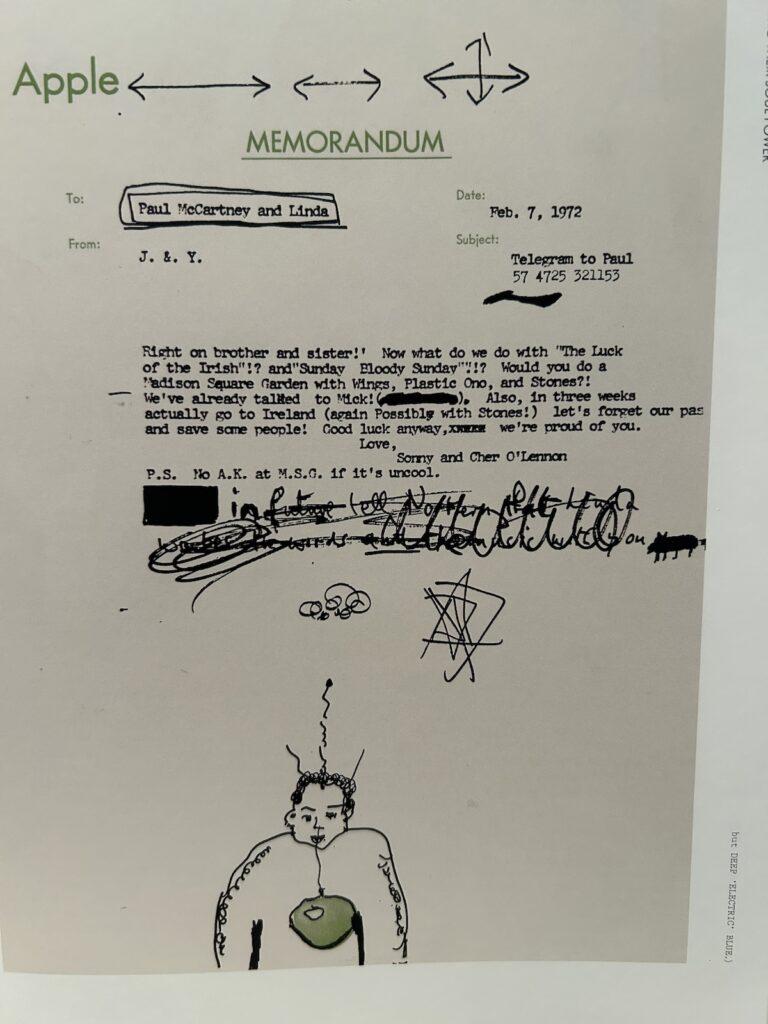
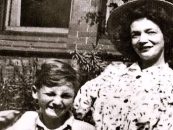
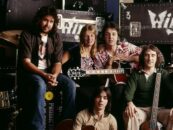
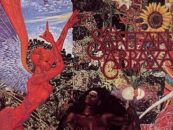
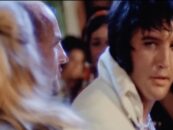

8 Comments so far
Jump into a conversationIn terms of his ‘activism,’ Lennon always struck me as a poser. On the same subject with McCartney, I view it as just one of many examples of his trying to be ‘cool,’ when he’s has always been anything but. Talented songwriter, no doubt, but cool? Not in a million years.
I couldn’t agree more, dg. The were times John blathered on just to hear the sound of his own voice.
Tell us you know absolutely nothing about John and Paul without telling us you know absolutely nothing about John and Paul
Completely and utterly incorrect . .
John Lennon’s activism directly resulted in the release of John Sinclair, who had been sentenced to 10 years for possession of two joints.
He also contributed to the campaign to impeach President Richard Nixon, which resulted in agents transcribing his between song banter at live performances, and also wire-tapping his phone lines. He must have ruffled some feathers in high places in order to warrant this kind of attention.
He also increased awareness and support in the US for the Civil Rights Campaign in Northern Ireland.
. . Also, with regard to Paul McCartney being ‘cool’ . . In the mid 1960’s he was considered to be one of the coolest guys on the planet . . You really do know sweet F.A. about The Beatles or popular history of the 1960’s and 1970’s don’t you ?
to further drive the olive branch home….. the crossed out portion at the end reads “in future, tell Northern (Songs-their music publisher) Linda writes the words and music with you.”..friendly advice from John on how to handle Northern’s million dollar lawsuit against Paul and Linda claiming a violation of Paul’s “exclusive rights agreement” as the “Another Day” single, as well as several tracks from Paul’s Ram album, were credited to both Paul and Linda. this telegram is a great find!
Very interesting and fascinating revelation that’s gotta be worth a pretty penny. And thanks to Paul above me who was somehow able to decipher the crossed out words good stuff
IMO a Beatles reunion would’ve happened about 1984.